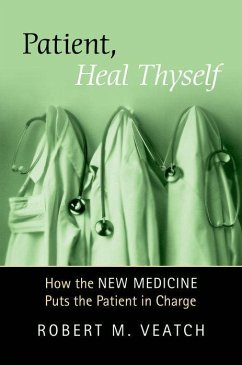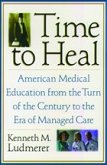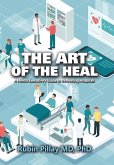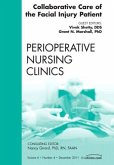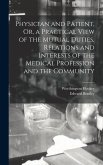- Gebundenes Buch
- Merkliste
- Auf die Merkliste
- Bewerten Bewerten
- Teilen
- Produkt teilen
- Produkterinnerung
- Produkterinnerung
Patient, Heal Thyself is on a theme developed by the author for 30 years, that a radical change is sweeping through the American healthcare system that puts the patient in charge of treatment to an unprecedented extent.
Andere Kunden interessierten sich auch für
![Time to Heal Time to Heal]() Kenneth M. LudmererTime to Heal57,99 €
Kenneth M. LudmererTime to Heal57,99 €![The Art of the Heal The Art of the Heal]() Rubin PillayThe Art of the Heal32,99 €
Rubin PillayThe Art of the Heal32,99 €![Collaborative Care of the Facial Injury Patient, an Issue of Perioperative Nursing Clinics Collaborative Care of the Facial Injury Patient, an Issue of Perioperative Nursing Clinics]() Vivek ShettyCollaborative Care of the Facial Injury Patient, an Issue of Perioperative Nursing Clinics75,99 €
Vivek ShettyCollaborative Care of the Facial Injury Patient, an Issue of Perioperative Nursing Clinics75,99 €![When Cancer Visits: How to Free Your Mind from the Grip of Distress and Heal Your Jolted Nervous System When Cancer Visits: How to Free Your Mind from the Grip of Distress and Heal Your Jolted Nervous System]() Manuela M. KogonWhen Cancer Visits: How to Free Your Mind from the Grip of Distress and Heal Your Jolted Nervous System33,99 €
Manuela M. KogonWhen Cancer Visits: How to Free Your Mind from the Grip of Distress and Heal Your Jolted Nervous System33,99 €![Heal Us O Lord: A Chaplain's Interface with Pain Heal Us O Lord: A Chaplain's Interface with Pain]() Sidney GoldsteinHeal Us O Lord: A Chaplain's Interface with Pain22,99 €
Sidney GoldsteinHeal Us O Lord: A Chaplain's Interface with Pain22,99 €![Physician and Patient, Or, a Practical View of the Mutual Duties, Relations and Interests of the Medical Profession and the Community Physician and Patient, Or, a Practical View of the Mutual Duties, Relations and Interests of the Medical Profession and the Community]() Worthington HookerPhysician and Patient, Or, a Practical View of the Mutual Duties, Relations and Interests of the Medical Profession and the Community38,99 €
Worthington HookerPhysician and Patient, Or, a Practical View of the Mutual Duties, Relations and Interests of the Medical Profession and the Community38,99 €![Nurse and Patient, and Camp Cure Nurse and Patient, and Camp Cure]() Silas Weir MitchellNurse and Patient, and Camp Cure33,99 €
Silas Weir MitchellNurse and Patient, and Camp Cure33,99 €-
-
-
Patient, Heal Thyself is on a theme developed by the author for 30 years, that a radical change is sweeping through the American healthcare system that puts the patient in charge of treatment to an unprecedented extent.
Hinweis: Dieser Artikel kann nur an eine deutsche Lieferadresse ausgeliefert werden.
Hinweis: Dieser Artikel kann nur an eine deutsche Lieferadresse ausgeliefert werden.
Produktdetails
- Produktdetails
- Verlag: Oxford University Press
- Seitenzahl: 304
- Erscheinungstermin: 4. November 2008
- Englisch
- Abmessung: 236mm x 157mm x 25mm
- Gewicht: 567g
- ISBN-13: 9780195313727
- ISBN-10: 0195313720
- Artikelnr.: 24423261
- Herstellerkennzeichnung
- Libri GmbH
- Europaallee 1
- 36244 Bad Hersfeld
- gpsr@libri.de
- Verlag: Oxford University Press
- Seitenzahl: 304
- Erscheinungstermin: 4. November 2008
- Englisch
- Abmessung: 236mm x 157mm x 25mm
- Gewicht: 567g
- ISBN-13: 9780195313727
- ISBN-10: 0195313720
- Artikelnr.: 24423261
- Herstellerkennzeichnung
- Libri GmbH
- Europaallee 1
- 36244 Bad Hersfeld
- gpsr@libri.de
Robert Veatch is Professor of Medical Ethics at the Kennedy Institute of Ethics, Georgetown University. He received the career distinguished achievement award from Georgetown University in 2005 and has received honorary doctorates from Creighton and Union College. He is listed in Who's Who in America.
* Table of Contents
* Detailed Table of Contents
* List of Cases
* Preface
* The New Medicine: An Introduction
* Part I: Why Doctor Does Not Know Best
* 1: The Puzzling Case of the Broken Arm
* 2: The Hernias, Diets, and Drugs
* 3: Doctor Doesn't Know Best: Why Physicians Cannot Know What Will
Benefit Patients
* 4: Sacrificing Patient Benefit to Protect Patient Rights
* 5: Sacrificing a Patient: Societal Interests and Duties to Others
* 6: The New, Limited Twenty-first-century Role for Physicians as
Patient Assistants
* 7: Abandoning Modern Medical Concepts: Doctors "Orders" and Hospital
Discharge
* 8: Medicine Can't "Indicate:" So Why Do We Talk That Way?
* 9: Medical Necessity and Treatments of Choice: Who is Fooling Whom?
* Part II: New Concepts for the New Medicine
* 10: Abandoning Informed Consent
* 11: Why Physicians Get It Wrong and the Alternatives to Consent:
Patient Choice and Deep Value Pairing
* 12: The End of Prescribing: Why Prescription Writing is Irrational
* 13: The Alternatives to Prescribing
* 14: Are Fat People Overweight
* 15: Beyond Prettiness: Death, Disease, and Being Fat
* 16: Universal but Varied Health Insurance: Only Separate is Equal
* 17: Health Insurance: The Case for Multiple Lists
* 18: Why Hospice Care Should Not be a Part of Ideal Health Care: The
History of the Hospice
* 19: Why Hospice Care Should Not be a Part of Ideal Health Care:
Hospice in a Postmodern Era
* Part III: The New Medicine and the New Medical Science
* 20: Randomized Human Experimentation: The Modern Dilemma
* 21: Randomized Human Experimentation: A Proposal for the New Medicine
* 22: Clinical Practice Guidelines and Why They Are Wrong
* 23: Outcomes Research and How Values Sneak into Finding of Fact
* 24: The Consensus of Medical Experts and Why it is Wrong So Often
* Epilogue: A Patient Manifesto
* Detailed Table of Contents
* List of Cases
* Preface
* The New Medicine: An Introduction
* Part I: Why Doctor Does Not Know Best
* 1: The Puzzling Case of the Broken Arm
* 2: The Hernias, Diets, and Drugs
* 3: Doctor Doesn't Know Best: Why Physicians Cannot Know What Will
Benefit Patients
* 4: Sacrificing Patient Benefit to Protect Patient Rights
* 5: Sacrificing a Patient: Societal Interests and Duties to Others
* 6: The New, Limited Twenty-first-century Role for Physicians as
Patient Assistants
* 7: Abandoning Modern Medical Concepts: Doctors "Orders" and Hospital
Discharge
* 8: Medicine Can't "Indicate:" So Why Do We Talk That Way?
* 9: Medical Necessity and Treatments of Choice: Who is Fooling Whom?
* Part II: New Concepts for the New Medicine
* 10: Abandoning Informed Consent
* 11: Why Physicians Get It Wrong and the Alternatives to Consent:
Patient Choice and Deep Value Pairing
* 12: The End of Prescribing: Why Prescription Writing is Irrational
* 13: The Alternatives to Prescribing
* 14: Are Fat People Overweight
* 15: Beyond Prettiness: Death, Disease, and Being Fat
* 16: Universal but Varied Health Insurance: Only Separate is Equal
* 17: Health Insurance: The Case for Multiple Lists
* 18: Why Hospice Care Should Not be a Part of Ideal Health Care: The
History of the Hospice
* 19: Why Hospice Care Should Not be a Part of Ideal Health Care:
Hospice in a Postmodern Era
* Part III: The New Medicine and the New Medical Science
* 20: Randomized Human Experimentation: The Modern Dilemma
* 21: Randomized Human Experimentation: A Proposal for the New Medicine
* 22: Clinical Practice Guidelines and Why They Are Wrong
* 23: Outcomes Research and How Values Sneak into Finding of Fact
* 24: The Consensus of Medical Experts and Why it is Wrong So Often
* Epilogue: A Patient Manifesto
* Table of Contents
* Detailed Table of Contents
* List of Cases
* Preface
* The New Medicine: An Introduction
* Part I: Why Doctor Does Not Know Best
* 1: The Puzzling Case of the Broken Arm
* 2: The Hernias, Diets, and Drugs
* 3: Doctor Doesn't Know Best: Why Physicians Cannot Know What Will
Benefit Patients
* 4: Sacrificing Patient Benefit to Protect Patient Rights
* 5: Sacrificing a Patient: Societal Interests and Duties to Others
* 6: The New, Limited Twenty-first-century Role for Physicians as
Patient Assistants
* 7: Abandoning Modern Medical Concepts: Doctors "Orders" and Hospital
Discharge
* 8: Medicine Can't "Indicate:" So Why Do We Talk That Way?
* 9: Medical Necessity and Treatments of Choice: Who is Fooling Whom?
* Part II: New Concepts for the New Medicine
* 10: Abandoning Informed Consent
* 11: Why Physicians Get It Wrong and the Alternatives to Consent:
Patient Choice and Deep Value Pairing
* 12: The End of Prescribing: Why Prescription Writing is Irrational
* 13: The Alternatives to Prescribing
* 14: Are Fat People Overweight
* 15: Beyond Prettiness: Death, Disease, and Being Fat
* 16: Universal but Varied Health Insurance: Only Separate is Equal
* 17: Health Insurance: The Case for Multiple Lists
* 18: Why Hospice Care Should Not be a Part of Ideal Health Care: The
History of the Hospice
* 19: Why Hospice Care Should Not be a Part of Ideal Health Care:
Hospice in a Postmodern Era
* Part III: The New Medicine and the New Medical Science
* 20: Randomized Human Experimentation: The Modern Dilemma
* 21: Randomized Human Experimentation: A Proposal for the New Medicine
* 22: Clinical Practice Guidelines and Why They Are Wrong
* 23: Outcomes Research and How Values Sneak into Finding of Fact
* 24: The Consensus of Medical Experts and Why it is Wrong So Often
* Epilogue: A Patient Manifesto
* Detailed Table of Contents
* List of Cases
* Preface
* The New Medicine: An Introduction
* Part I: Why Doctor Does Not Know Best
* 1: The Puzzling Case of the Broken Arm
* 2: The Hernias, Diets, and Drugs
* 3: Doctor Doesn't Know Best: Why Physicians Cannot Know What Will
Benefit Patients
* 4: Sacrificing Patient Benefit to Protect Patient Rights
* 5: Sacrificing a Patient: Societal Interests and Duties to Others
* 6: The New, Limited Twenty-first-century Role for Physicians as
Patient Assistants
* 7: Abandoning Modern Medical Concepts: Doctors "Orders" and Hospital
Discharge
* 8: Medicine Can't "Indicate:" So Why Do We Talk That Way?
* 9: Medical Necessity and Treatments of Choice: Who is Fooling Whom?
* Part II: New Concepts for the New Medicine
* 10: Abandoning Informed Consent
* 11: Why Physicians Get It Wrong and the Alternatives to Consent:
Patient Choice and Deep Value Pairing
* 12: The End of Prescribing: Why Prescription Writing is Irrational
* 13: The Alternatives to Prescribing
* 14: Are Fat People Overweight
* 15: Beyond Prettiness: Death, Disease, and Being Fat
* 16: Universal but Varied Health Insurance: Only Separate is Equal
* 17: Health Insurance: The Case for Multiple Lists
* 18: Why Hospice Care Should Not be a Part of Ideal Health Care: The
History of the Hospice
* 19: Why Hospice Care Should Not be a Part of Ideal Health Care:
Hospice in a Postmodern Era
* Part III: The New Medicine and the New Medical Science
* 20: Randomized Human Experimentation: The Modern Dilemma
* 21: Randomized Human Experimentation: A Proposal for the New Medicine
* 22: Clinical Practice Guidelines and Why They Are Wrong
* 23: Outcomes Research and How Values Sneak into Finding of Fact
* 24: The Consensus of Medical Experts and Why it is Wrong So Often
* Epilogue: A Patient Manifesto

